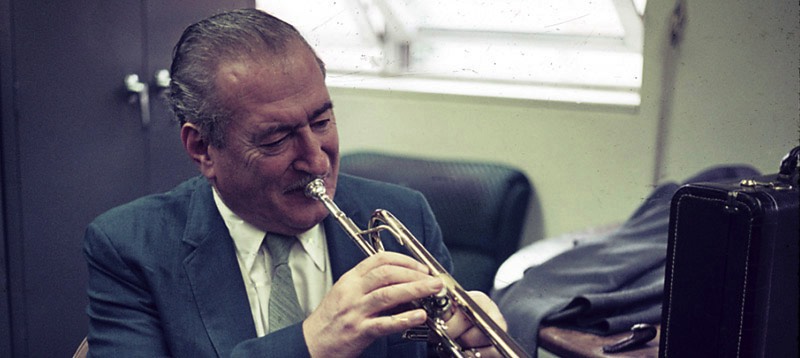William Vacchiano © 2016 Brian A. Shook
Quotes on Equipment
William Vacchiano on Equipment

“We also almost never saw his regular trumpets at lessons. I think that in four years of study I only once or twice heard him play his regular Bach C trumpet in a lesson. Normally, he would play on his old Conn 22B. In the 1930s, these were the trumpets that Harry Glantz, Mr. Vacchiano, and other members of the trumpet section had used in the New York Philharmonic. I think they have been copied from the pre-war French Besson. I played on one, too, which he liked. It seemed to be his test bed for his mouthpiece experiments. I guess he trusted it and it formed a reliable basis from which he could make judgments about mouthpieces.”
(Scott Whitener)
“He once told me to melt some paraffin wax and get a matchstick to stick down the throat of the trumpet and then pour the wax in. In other words, temporarily tighten the bore or form a small disc that would serve as raising the bottom of your mouthpiece. So you would take a mouthpiece and you would plug up the throat and then take hot liquid wax and just add a little bit to the bottom and then that thing would fall out and fit into the throat and it would flatten out the bottom of the mouthpiece. In effect you are creating a temporary high note mouthpiece.”
(Frank Hosticka)
Bill Spilka asked Vacchiano in an interview: “In a program of French music, would you tell the rest of your section, ‘I want you to use small-bore horns here,’ or would they automatically have the same feeling about the sound that you did?’”
Vacchiano replied: “No, what happens in a situation like that is that only the first trumpet will change his horn. If I’m using a smaller bore, the second player just plays more lightly so as not to overshadow me—he’s sensitive to that. It becomes automatic on his part. They all know from the character of the music how to blow. They wouldn’t play the same kind of a forte in Debussy as they would in Wagner. I was very lucky to have Prager on second. He was part of my whole success. He helped me tremendously. He knew exactly what to do before it was done. Without a man like that it could have been a very difficult job. A lot of principal players really suffer with their second trumpets.”
“The mouthpiece is as important to a trumpet player as a scalpel is to a surgeon. Without the right mouthpiece the aspiring trumpet student will never develop his potential range and ability.”
(Vacchiano)
“I foresee in the far future when beginning trumpet players will be able to have their lips analyzed and given the correct mouthpiece size. We already have machines to measure eyes, so why not the lips?”
(Vacchiano)
(Scott Whitener)
“He once told me to melt some paraffin wax and get a matchstick to stick down the throat of the trumpet and then pour the wax in. In other words, temporarily tighten the bore or form a small disc that would serve as raising the bottom of your mouthpiece. So you would take a mouthpiece and you would plug up the throat and then take hot liquid wax and just add a little bit to the bottom and then that thing would fall out and fit into the throat and it would flatten out the bottom of the mouthpiece. In effect you are creating a temporary high note mouthpiece.”
(Frank Hosticka)
Bill Spilka asked Vacchiano in an interview: “In a program of French music, would you tell the rest of your section, ‘I want you to use small-bore horns here,’ or would they automatically have the same feeling about the sound that you did?’”
Vacchiano replied: “No, what happens in a situation like that is that only the first trumpet will change his horn. If I’m using a smaller bore, the second player just plays more lightly so as not to overshadow me—he’s sensitive to that. It becomes automatic on his part. They all know from the character of the music how to blow. They wouldn’t play the same kind of a forte in Debussy as they would in Wagner. I was very lucky to have Prager on second. He was part of my whole success. He helped me tremendously. He knew exactly what to do before it was done. Without a man like that it could have been a very difficult job. A lot of principal players really suffer with their second trumpets.”
“The mouthpiece is as important to a trumpet player as a scalpel is to a surgeon. Without the right mouthpiece the aspiring trumpet student will never develop his potential range and ability.”
(Vacchiano)
“I foresee in the far future when beginning trumpet players will be able to have their lips analyzed and given the correct mouthpiece size. We already have machines to measure eyes, so why not the lips?”
(Vacchiano)